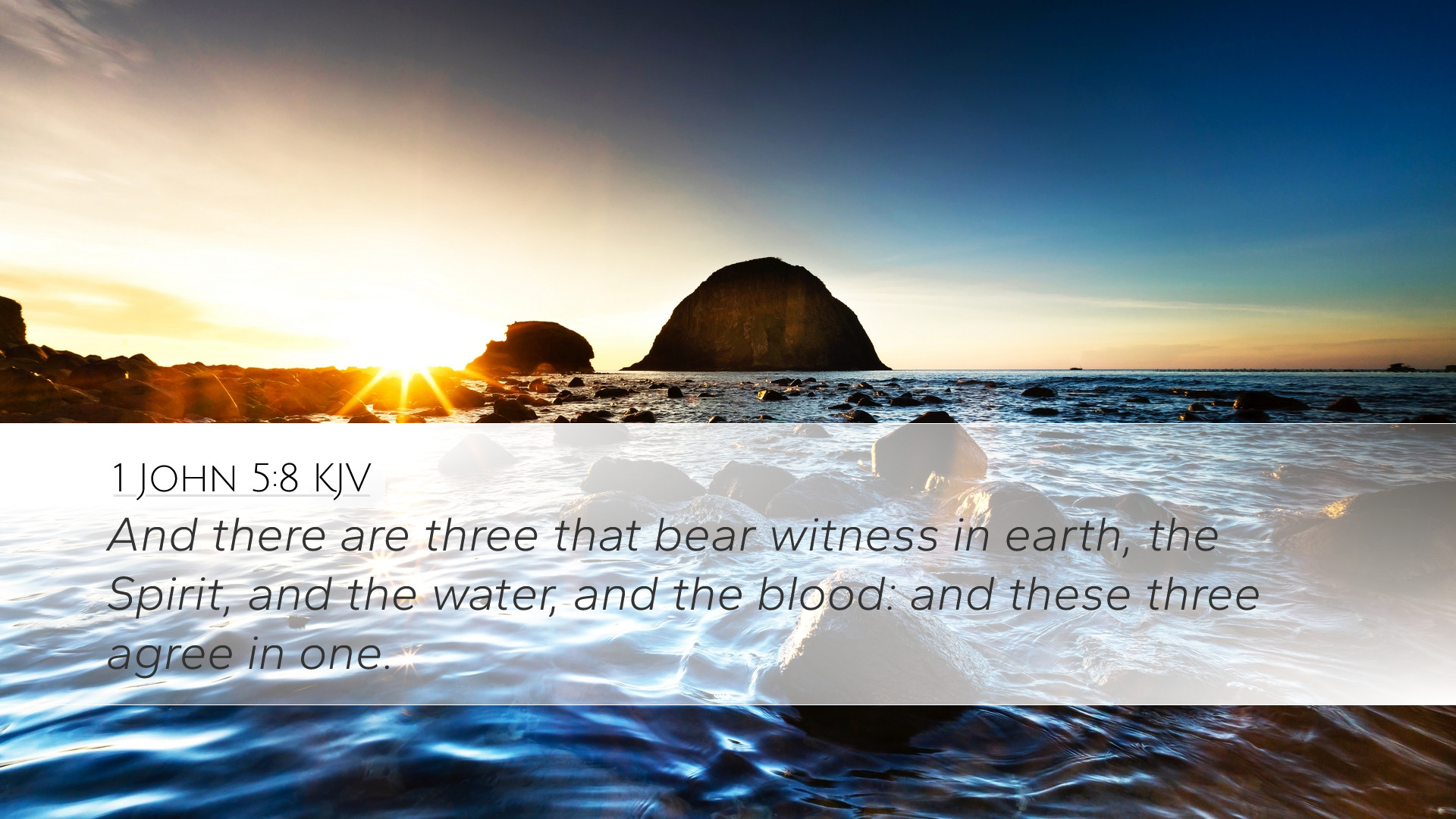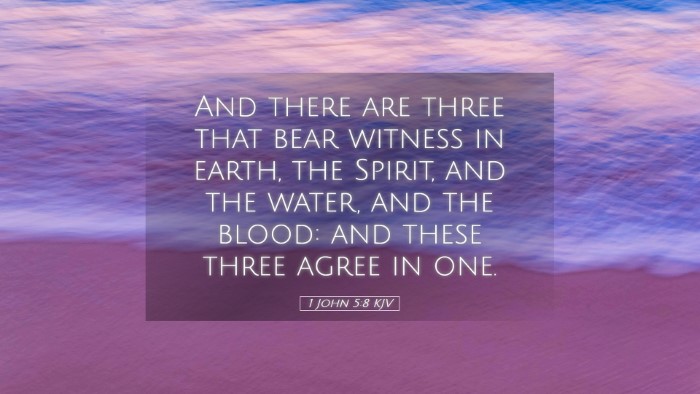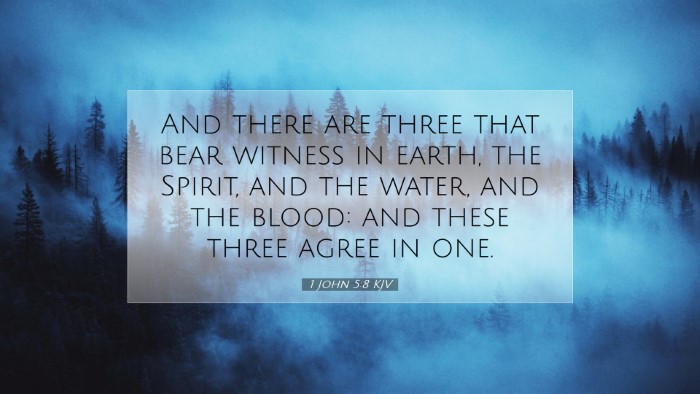Old Testament
Genesis Exodus Leviticus Numbers Deuteronomy Joshua Judges Ruth 1 Samuel 2 Samuel 1 Kings 2 Kings 1 Chronicles 2 Chronicles Ezra Nehemiah Esther Job Psalms Proverbs Ecclesiastes Song of Solomon Isaiah Jeremiah Lamentations Ezekiel Daniel Hosea Joel Amos Obadiah Jonah Micah Nahum Habakkuk Zephaniah Haggai Zechariah Malachi1 John 5:8
1 John 5:8 KJV
And there are three that bear witness in earth, the Spirit, and the water, and the blood: and these three agree in one.
1 John 5:8 Bible Commentary
Commentary on 1 John 5:8
Verse Text: "And there are three that bear witness on earth, the Spirit and the water and the blood; and these three agree as one."
Introduction
This verse constitutes a profound theological assertion regarding the nature of witness and testimony in the context of faith. 1 John 5:8 reinforces the doctrine of the Trinity and the essential role of various elements in the believer's assurance of salvation. By synthesizing insights from notable public domain commentaries—namely Matthew Henry, Albert Barnes, and Adam Clarke—we delve into a comprehensive exploration of this rich scripture.
Exegesis of the Text
The scripture presents a triadic structure, emphasizing the importance of the Spirit, the water, and the blood. Each of these elements symbolizes a distinct yet interconnected testimony to the truth of Jesus Christ.
The Spirit
Commentary Insights:
- Matthew Henry notes that the Holy Spirit is the primary witness to the truth of God, asserting the reality of Christ's divinity and resurrection. The Spirit convicts hearts, demonstrating the efficacy of Christ's sacrifice.
- Albert Barnes emphasizes that the Spirit's witness is both internal and external, affirming believers' faith through mystical experiences and scriptural illumination.
- Adam Clarke elaborates that the Spirit's presence among believers serves as a guide, leading them into all truth, reinforcing their understanding of salvation through faith in Christ.
The Water
Symbolism of Water: Water here symbolizes both baptism and the purity brought through Christ's ministry.
- Henry suggests that the reference to water emphasizes the baptism of Jesus and the initiation into the faith, marking the believer's acknowledgment of their need for salvation.
- Barnes adds that water signifies the cleansing power of the Word and the Holy Spirit in the life of the believer, illustrating that through Christ, they are made clean.
- Clarke interprets the water as a symbol of spiritual rebirth, linking it to the new birth essential for salvation as described in John 3:5.
The Blood
Significance of Blood: The blood signifies Christ’s sacrificial atonement, central to Christian faith.
- Matthew Henry makes it clear that the blood of Christ is the basis of redemption, pointing to the necessity of His sacrifice for the forgiveness of sins.
- Albert Barnes reflects on the powerful testimony of Christ's blood, which speaks of mercy and grace, providing believers confidence in their justification before God.
- Adam Clarke emphasizes the sacrificial aspect of the blood, arguing that it represents the new covenant established through Christ’s death, pivotal to understanding salvation.
Unity of Witness
The conjunction of these three elements—the Spirit, water, and blood—in this verse illustrates their harmonious agreement in the testimony of Christ. They collectively affirm the truth of the Gospel and serve as vital components of the believer's spiritual experience.
Theological Implications
Understanding Assurance: This triadic witness provides believers with assurance in their faith. The theological implication is that true belief is substantiated by the work of the Spirit and is re-affirmed through baptism and the atoning blood of Christ.
- Matthew Henry points out that this assurance is foundational for the believer's confidence in their relationship with God.
- Barnes highlights that this agreement of the three witnesses solidifies the reliability of the Christian faith, thereby countering false teachings.
- Clarke concludes that believers should anchor their faith not just in tradition, but in the experiential witness of the Spirit and the historical reality of Christ's sacrifice.
Conclusion
1 John 5:8 invites believers to reflect upon the rich tapestry of testimony that sustains their faith. The Spirit, water, and blood, while distinct in their roles, converge to provide a robust affirmation of the truth and reliability of Jesus Christ as the Savior. Pastors, students, theologians, and Bible scholars must consider the theological and practical implications of this verse in addressing the doubts and questions that modern believers face.
As we continue to explore the depths of Scripture, may we discover renewed strength in the agreement of the Spirit, the water, and the blood—assuring us of our identity and inheritance in Christ.


